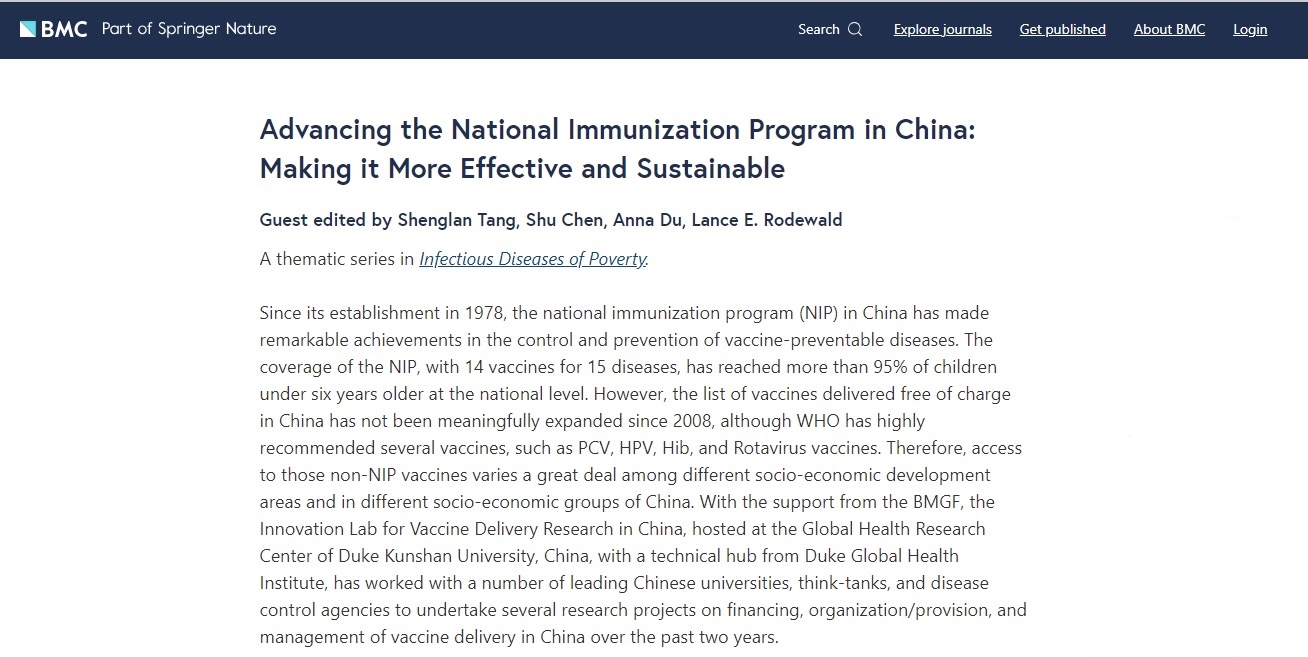The Innovation Lab for Vaccine Delivery Research (VaxLab) at Duke Kunshan University newly published a thematic series ” Advancing the National Immunization Program in China: Making it More Effective and Sustainable” in the BMC Infectious Disease of Poverty, a top medical journal under the Springer Nature group.
The series, featuring one editorial, three commentaries, one scoping review, four original studies, and three case studies, is an output of VaxLab’s ongoing work. It provides an overview of immunization in China while setting the stage for future research and policy advocacy to achieve universal vaccine coverage in China.

This year marks the 50th anniversary of the Expanded Programme on Immunization (EPI) initiated by the World Health Organization (WHO) in 1974. The program has expanded in countries and regions around the globe ever since, reshaping the landscape of global health and achieving notable successes in preventing a wide range of diseases, improving child and maternal health, and promoting equitable access to health care.
The “Immunization Agenda 2030” (IA2030) is a global strategy adopted by the WHO and its partners in 2021 to reduce the number of vaccine-preventable deaths and diseases significantly and to achieve universal coverage with WHO-recommended vaccines. The core components and strategic priorities of IA2030 emphasize strengthening health systems and integrating an inclusive and life-course approach to immunization. Increased vaccine coverage will also contribute to the achievement of the health-related UN Sustainable Development Goals (SDGs), particularly reducing child mortality, combating infectious diseases, and strengthening the capacity of all countries in early warning, risk reduction, and management of national and global health risks.
China is one of the first countries in the world to launch an immunization program with the most extensive coverage. China initiated the EPI (Notes: China’s EPI was reorganized and renamed as National Immunization Program in 2002) in 1978. Over the past 46 years, it has achieved remarkable results in preventing and controlling vaccine-preventable diseases. The National Immunization Program (NIP) currently provides 14 vaccines against 15 diseases, including hepatitis B and polio, covering more than 95% of children under six nationwide.
However, the last expansion of the NIP was in 2008. Of the ten vaccines recommended by the WHO for all immunization programs, four are not yet included in China’s NIP, namely, pneumococcal conjugate vaccine (PCV), human papillomavirus vaccine (HPV), Haemophilus influenzae type B vaccine (Hib), and rotavirus vaccine (RV). While the better-off population in China can afford to pay out of pocket for these non-NIP vaccines, people from low-income groups often cannot afford them. The disparity in access to these vaccines is evident in coverage among different socio-economic groups.
“As one of the most populous countries in the world, China has a large number of children who need to be vaccinated each year. Increasing vaccination coverage in China will greatly contribute to achieving the ‘Immunization Agenda 2030’ vision and the health-related United Nations Sustainable Development Goals (SDGs). Strengthening China’s NIP requires a systematic and comprehensive approach, and related policies and solutions should target health governance, financing, workforce, information systems, and vaccine delivery to improve vaccination coverage,” said Professor Shenglan Tang, Co-Director of the DKU Global Health Research Center, Head of the VaxLab, and Guest Editor of the BMC thematic series.

This thematic series introduced the immunization landscape in China from different perspectives, with a particular focus on how to improve the coverage of four non-NIP vaccines:
| Categories | Subject |
| Editorial | Advancing the National Immunization Program in an era of achieving universal vaccine coverage in China and beyond |
| Commentaries | Accelerating into Immunization Agenda 2030 with momentum from China’s successful COVID-19 vaccination campaign during dynamic COVID Zero |
| Promoting higher-valent pediatric combination vaccines in China: challenges and recommendations for action | |
| Tackling barriers to scale up human papillomavirus vaccination in China: progress and the way forward | |
| Scoping review | The coverage and challenges of increasing uptake of non-National Immunization Program vaccines in China: a scoping review |
| Original studies | Prevalence and serotype distribution of nasopharyngeal carriage of Streptococcus pneumonia among healthy children under 5 years of age in Hainan Province, China |
| Immunization coverage, knowledge, satisfaction, and associated factors of non-National Immunization Program vaccines among migrant and left-behind families in China: evidence from Zhejiang and Henan provinces | |
| Factors associated with recommendation behaviors of four non-National Immunization Program vaccines: a cross-sectional survey among public health workers in China | |
| Prevalence and factors associated with pentavalent vaccination: a cross-sectional study in Southern China | |
| Case studies | 13-Valent pneumococcal conjugate vaccines vaccination innovative strategy in Weifang City, China: a case study |
| Accelerating Pneumococcal Conjugate Vaccine introductions in Indonesia: key learnings from 2017 to 2022 | |
| Implementing the free HPV vaccination for adolescent girls aged below 14 in Shenzhen, Guangdong Province of China: experience, challenges, and lessons |
About VaxLab

With the support of the Bill & Melinda Gates Foundation, VaxLab was established in 2021 and has collaborated with several leading universities, government think tanks, and national/provincial disease control and prevention centers in China on vaccine delivery research and policy advocacy.
Carrying out a total of 15 research projects, VaxLab produced a series of deliverables, including nine policy briefs, 27 peer-reviewed publications (including the thematic series), over 40 articles on leading media cited the findings or interviewed VaxLab’s network researchers for policy advocacy, and nine online workshops featuring renowned domestic and international experts to share the latest research progress. All the work and deliverables aim to strengthen China’s NIP via high-quality research evidence and policy advocacy activities. They cover a wide range of topics, including the optimization of immunization strategies, local immunization pilot policies, health economics evidence of vaccines, financing and procurement, maternal vaccination, and the development and uptake of pediatric combination vaccines, etc., which have gained the attention of policymakers and the industry.
While working to strengthen China’s NIP and accelerate the inclusion of WHO-recommended vaccines into the NIP, VaxLab’s future research endeavors will focus on three key areas – improving vaccine financing, emphasizing diversity, equity, and inclusion (DEI) in immunization, and maternal vaccination. At the same time, VaxLab will expand its geographic interest to include countries in the Southeast Asian and Western Pacific WHO regions, especially in those Gavi-ineligible middle-income countries (MICs) that face the greatest challenges in financing and delivering vaccines. Good practices, challenges, and lessons learned will be shared through joint efforts to improve vaccine coverage in China and beyond.
Check the full version of the Thematic Series at
https://www.biomedcentral.com/collections/cnnip

